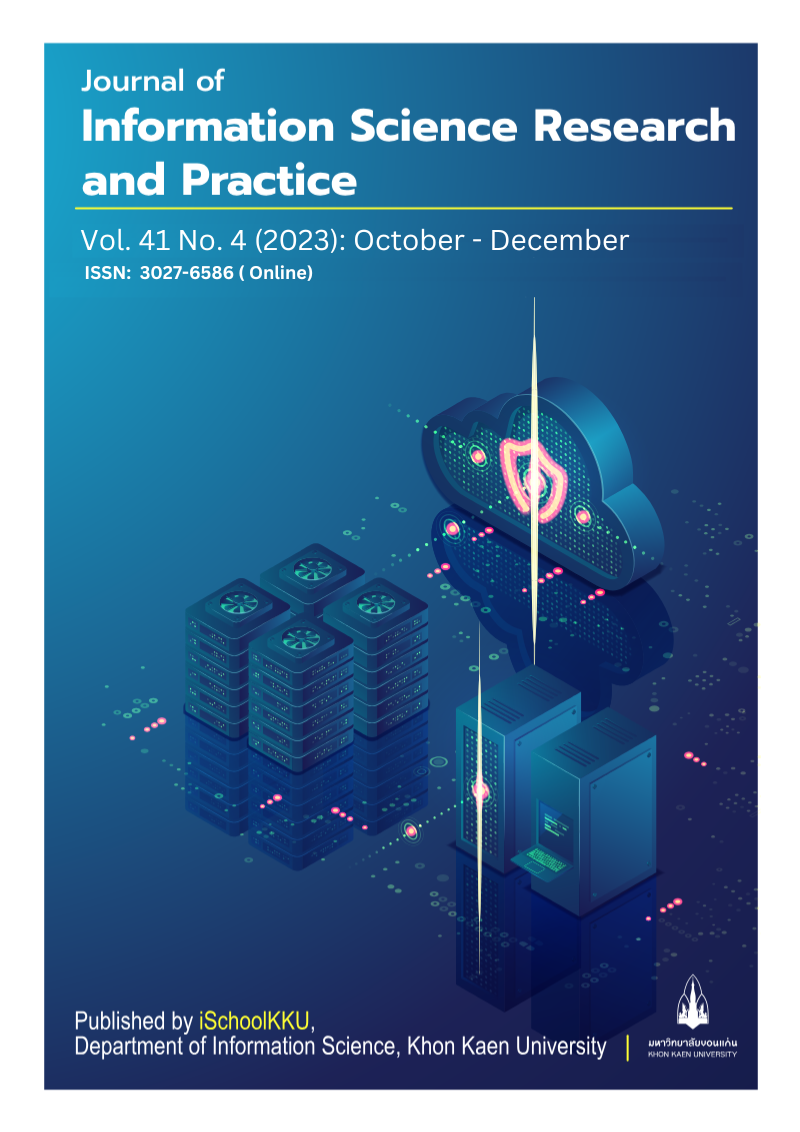ปัจจัยที่เกี่ยวข้องในการแลกเปลี่ยนสารสนเทศสุขภาพ: การทบทวนวรรณกรรม
DOI:
https://doi.org/10.14456/jiskku.2023.31คำสำคัญ:
การแลกเปลี่ยนสารสนเทศสุขภาพ , ข้อมูลสุขภาพ , ปัจจัยบทคัดย่อ
วัตถุประสงค์: เพื่อศึกษาปัจจัยที่เกี่ยวข้องในการแลกเปลี่ยนสารสนเทศสุขภาพ โดยการทบทวนวรรณกรรม
วิธีการศึกษา: การวิจัยครั้งนี้เป็นการทบทวนงานวิจัยอย่างเป็นระบบ โดยการสืบค้นรายงานวิจัยภาษาไทยและภาษาอังกฤษ ที่ตีพิมพ์ระหว่างปี ค.ศ. 2010 - 2020 จากฐานข้อมูล PubMed, Science Direct, SpringerLink, ProQuest, Google Scholar, TCI-Thaijo และ ThaiLIS คัดเลือกงานวิจัยที่ศึกษาปัจจัยที่เกี่ยวข้องในการแลกเปลี่ยนสารสนเทศสุขภาพ การวิเคราะห์งานวิจัยใช้การวิเคราะห์เนื้อหาและการสรุปความ
ข้อค้นพบ: พบรายการบทความในการทบทวนระหว่างปี 2010 - 2020 จำนวนทั้งสิ้น 748 บทความ คัดบทความที่ซ้ำกันหรือไม่เกี่ยวข้องออกเหลือ 245 บทความ มีบทความที่เข้าเกณฑ์ที่กำหนด 18 บทความ ทั้งหมดเป็นบทความในภาษาอังกฤษ พบปัจจัยที่เกี่ยวข้อง ได้แก่ ความพร้อมของเครือข่าย ความมั่นคงปลอดภัยและความเป็นส่วนตัว การออกแบบการไหลของงาน การทำงานร่วมกัน คุณภาพของเวชระเบียนอิเล็กทรอนิกส์ โครงสร้างพื้นฐานด้านเทคโนโลยีสารสนเทศ สิ่งจูงใจ นโยบายและธรรมาภิบาล การยอมรับและความเชื่อมั่น การสนับสนุนของผู้นำ ค่าใช้จ่าย แรงจูงใจและการรับรู้คุณค่า
การประยุกต์ใช้จากการศึกษานี้: การทบทวนวรรณกรรมเกี่ยวกับปัจจัยที่เกี่ยวข้องกับการแลกเปลี่ยนสารสนเทศสุขภาพ สามารถแบ่งเป็น 4 ด้าน ได้แก่ ด้านนโยบายและธรรมาภิบาล ด้านองค์กรและเครือข่าย ด้านเทคโนโลยีและมาตรฐาน และด้านผู้ใช้ การศึกษานี้สนับสนุนกรอบแนวคิดการพัฒนารูปแบบการแลกเปลี่ยนสารสนเทศสุขภาพในประเทศไทย ทำให้เห็นปัจจัยที่ทำให้เกิดความสำเร็จหรือล้มเหลวของการแลกเปลี่ยนสารสนเทศสุขภาพ
Downloads
เอกสารอ้างอิง
Carr, C. M., Gilman, C. S., Krywko, D. M., Moore, H. E., Walker, B. J., & Saef, S. H. (2014). Observational study and estimate of cost savings from use of a health information exchange in an academic emergency department. The Journal of emergency medicine, 46(2), 250–256. https://doi.org/10.1016/j.jemermed.2013.05.068
Cross, D. A., McCullough, J. S., & Adler-Milstein, J. (2019). Drivers of health information exchange use during postacute care transitions. The American journal of managed care, 25(1), e7–e13.
Dixon, B.E. (2016). Health Information Exchange; Navigating and Managing a Network of Health Information Systems. Academic Press, Oxford, UK.
Downing, N. L., Adler-Milstein, J., Palma, J. P., Lane, S., Eisenberg, M., Sharp, C., Northern California HIE Collaborative, & Longhurst, C. A. (2017). Health information exchange policies of 11 diverse health systems and the associated impact on volume of exchange. Journal of the American Medical Informatics Association, 24(1), 113–122. https://doi.org/10.1093/jamia/ocw063
Dullabh, P., & Hovey, L. (2013). Large scale health information exchange: implementation experiences from five states. Studies in health technology and informatics, 192, 613–617.
Fontaine, P., Ross, S. E., Zink, T., & Schilling, L. M. (2010). Systematic review of health information exchange in primary care practices. Journal of the American Board of Family Medicine, 23(5), 655–670. https://doi.org/10.3122/jabfm.2010.05.090192
Fontaine, P., Zink, T., Boyle, R. G., & Kralewski, J. (2010). Health information exchange: participation by Minnesota primary care practices. Archives of internal medicine, 170(7), 622–629. https://doi.org/10.1001/archinternmed.2010.54
Gadd, C. S., Ho, Y. X., Cala, C. M., Blakemore, D., Chen, Q., Frisse, M. E., & Johnson, K. B. (2011). User perspectives on the usability of a regional health information exchange. Journal of the American Medical Informatics Association, 18(5), 711–716. https://doi.org/10.1136/amiajnl-2011-000281
Hersh, W., Totten, A., Eden, K., Devine, B., Gorman, P., Kassakian, S., Woods, S. S., Daeges, M., Pappas, M., & McDonagh, M. S. (2015). Health Information Exchange. Evidence report/technology assessment, (220), 1–465. doi.org/10.23970/AHRQEPCERTA220
Holen-Rabbersvik, E., Thygesen, E., Eikebrokk, T. R., Fensli, R. W., & Slettebø, Å. (2018). Barriers to exchanging healthcare information in inter-municipal healthcare services: a qualitative case study. BMC medical informatics and decision making, 18(1), 92. https://doi.org/10.1186/s12911-018-0701-z
Kisekka, V., & Giboney, J. S. (2018). The Effectiveness of Health Care Information Technologies: Evaluation of Trust, Security Beliefs, and Privacy as Determinants of Health Care Outcomes. Journal of medical Internet research, 20(4), e107. https://doi.org/10.2196/jmir.9014
Kralewski, J. E., Zink, T., & Boyle, R. (2012). Factors influencing electronic clinical information exchange in small medical group practices. The Journal of rural health, 28(1), 28–33. https://doi.org/10.1111/j.1748-0361.2011.00372.x
McCarthy, D. B., Propp, K., Cohen, A., Sabharwal, R., Schachter, A. A., & Rein, A. L. (2014). Learning from health information exchange technical architecture and implementation in seven beacon communities. EGEMS (Washington, DC), 2(1), 1060. https://doi.org/10.13063/2327-9214.1060
Mäenpää, T., Asikainen, P., Gissler, M., Siponen, K., Maass, M., Saranto, K., & Suominen, T. (2011). Outcomes assessment of the regional health information exchange: a five-year follow-up study. Methods of information in medicine, 50(4), 308–318. https://doi.org/10.3414/ME10-01-0048
Ministry of Public Health (2017). Health Information Technology Strategic Plan Ministry of Public Health (2017-2026), Information and Communication Technology Center, Office of the Permanent Secretary, Ministry of Public Health. Nonthaburi, Thailand.
Ministry of Public Health (2018). Manual for data collection and delivery operations according to the health information standard structure. Strategy and Planning Division, Office of the Permanent Secretary, Ministry of Public Health. Nonthaburi: Thailand.
Overhage, L. M., Covich-Bordenick, J., Li, X., & Overhage, J. M. (2017). Factors Influencing Progress of Health Information Exchange Organizations in the United States. Studies in health technology and informatics, 245, 1236.
Pendergrass, J. C., & Chandrasekaran, R. (2019). Key Factors Affecting Ambulatory Care Providers' Electronic Exchange of Health Information With Affiliated and Unaffiliated Partners: Web-Based Survey Study. JMIR medical informatics, 7(4), e12000. https://doi.org/10.2196/12000
Patel, V., Abramson, E. L., Edwards, A., Malhotra, S., & Kaushal, R. (2011). Physicians' potential use and preferences related to health information exchange. International journal of medical informatics, 80(3), 171–180. https://doi.org/10.1016/j.ijmedinf.2010.11.008
Payne, T. H., Lovis, C., Gutteridge, C., Pagliari, C., Natarajan, S., Yong, C., & Zhao, L. P. (2019). Status of health information exchange: a comparison of six countries. Journal of global health, 9(2), 0204279. https://doi.org/10.7189/jogh.09.020427
Rudin, R., Volk, L., Simon, S., & Bates, D. (2011). What Affects Clinicians' Usage of Health Information Exchange? Applied clinical informatics, 2(3), 250–262. https://doi.org/10.4338/ACI-2011-03-RA-0021
Rudin, R. S., Motala, A., Goldzweig, C. L., & Shekelle, P. G. (2014). Usage and effect of health information exchange: a systematic review. Annals of internal medicine, 161(11), 803–811. https://doi.org/10.7326/M14-0877
Swain, M., Charles, D., Patel, V., Searcy, T. (2015). Health information exchange among U.S. non-federal acute care hospitals: 2008-2014. Washington DC: Office of the National Coordinator for Health Information Technology. ONC Data Brief No. 24.
Unertl, K. M., Johnson, K. B., & Lorenzi, N. M. (2012). Health information exchange technology on the front lines of healthcare: workflow factors and patterns of use. Journal of the American Medical Informatics Association, 19(3), 392–400. https://doi.org/10.1136/amiajnl-2011-000432
Winden, T. J., Boland, L. L., Frey, N. G., Satterlee, P. A., & Hokanson, J. S. (2014). Care everywhere, a point-to-point HIE tool: utilization and impact on patient care in the ED. Applied clinical informatics, 5(2), 388–401. https://doi.org/10.4338/ACI-2013-12-RA-0100
Yeager, V. A., Walker, D., Cole, E., Mora, A. M., & Diana, M. L. (2014). Factors related to health information exchange participation and use. Journal of medical systems, 38(8), 78. https://doi.org/10.1007/s 10916-014-0078-1







